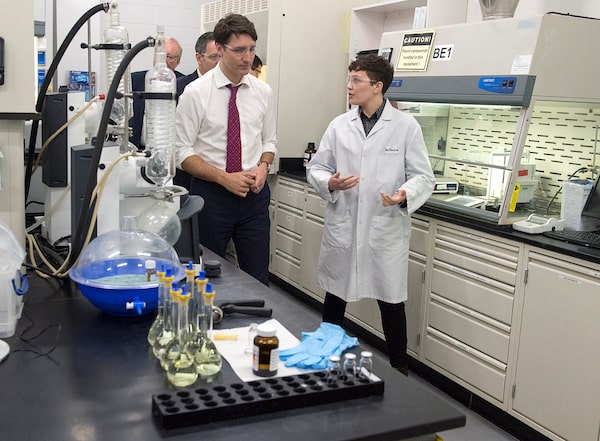
Prime Minister Justin Trudeau visits the biotechnology company BioVectra Inc. in Charlottetown on March 4, 2019. The Liberal government pledged $1-billion to support domestic life sciences and bio-manufacturing firms through its big-ticket Strategic Innovation Fund.Andrew Vaughan/The Canadian Press
The federal budget includes heavy commitments for innovation spending aimed at helping Canada’s economy climb out of its worst contraction since the 1930s.
It features billions of dollars of funding for life sciences and bio-manufacturing firms, quantum technologies, artificial intelligence (AI) as well as the third program in nine years to backstop venture capitalists.
Funding for innovation has been a hallmark of past Liberal budgets and features prominently in the 2021 edition: the word “innovation” or its variants appear 167 times. It’s a key driver of the $100-billion stimulus that the government pledged last fall.
For this generation of Liberals, government’s role is to do everything within its reach
“We must make sure we go where the puck is going – that we are investing strategically” in emerging technologies, the budget states. “This is where many of the jobs of the future lie, and we will bring people from across Canada along.”
Many initiatives extend or top up past Liberal innovation programs, including more funding for clean technologies, genomics research and women and under-represented entrepreneurs. The government committed $443.8-million for an AI strategy first seeded with $125-million in 2017 and a $60-million boost to its $950-million “superclusters” program launched in 2016. The budget pledges $100-million more per year to the Industrial Research Assistance Program, which funds promising early-stage tech companies.
In response to lobbying from the private capital industry, the government is planning a $450-million sequel to its similarly sized 2017 “venture capital catalyst initiative” program, which itself was a follow-up to a $390-million program introduced by the Conservative government in 2012. The programs, which seed VC firms with public money that must be matched by private investors, have helped drive record funding levels for Canadian tech companies and won broad support.
The government also committed to launch a strategic intellectual property (IP) program review to assess whether provisions in its innovation and science programs are working to ensure Canada fully benefits from domestic innovations. Despite launching an IP strategy in 2017, industry advocates worry Ottawa hasn’t done enough to prevent taxpayer-funded IP from leaking out of the country while leaving behind scant economic benefits. The government also committed $165-million to provide IP expertise to Canadian high-growth companies.
“The government’s focus on IP literacy for high-growth companies and increasing their access to IP experts is a very smart move for positioning Canada for the digital economy,” said Benjamin Bergen, executive director of the Council of Canadian Innovators, which represents fast-growing domestic tech companies.
But while government delivered on some key requests from industry, it fell short of bringing about some long-sought changes. There was no shake-up to the Scientific Research and Experimental Development (SR&ED) tax incentive program – Ottawa’s biggest innovation funding program – as many have requested. Long-standing calls for government to use its procurement power to buy more from Canadian innovators were met with a modest, five-year $84.7-million commitment limited to improving procurement from under-represented Black and Indigenous-run businesses. There was no word on a framework on open banking or commitments for financial innovation, despite a recent round of industry consultations.
The budget features plans to backstop innovators in emerging, strategic sectors with economic potential, including $5-billion to expand a “net zero accelerator” clean technology adoption program announced in December.
Canada is offering belated support for industries pioneered in the country, including quantum computing, which will be the subject of a $360-million national strategy. The increase in support for AI comes after the near-collapse of federally funded startup Element AI.
The government is also creating the position of data commissioner to inform government and business approaches to data-driven issues after lagging other jurisdictions in updating data-protection laws.
Jim Balsillie, chairman of the Council of Canadian Innovators, greeted the data commissioner news with skepticism.
“Creating a nebulous new role for a ‘Data Commissioner’ silos an economic and social asset that is a new factor of production,” he said. “It is the job of a properly empowered Privacy Commissioner to build trust in data and a properly empowered Competition Commissioner to address market dynamism in the data-driven economy.”
Meanwhile, Canada’s teeming life sciences sector, which drew record levels of financing last year, also got big funding promises from government. The Liberal government pledged $1-billion to support domestic life sciences and bio-manufacturing firms through its big-ticket Strategic Innovation Fund. It pledged to spend $250-million to bolster Canada’s clinical research capacity, to create a $250-million federal biomedical research-granting fund, to give $500-million to universities and research hospitals to support bioscience capital and infrastructure needs, and to give $50-million of venture capital funding to life sciences.
The 2021 federal budget will continue economic support for businesses and individuals through the summer with a roadmap to wind them down later in the year as more Canadians are vaccinated against COVID-19.
The Globe and Mail
Our Morning Update and Evening Update newsletters are written by Globe editors, giving you a concise summary of the day’s most important headlines. Sign up today.
 Sean Silcoff
Sean Silcoff